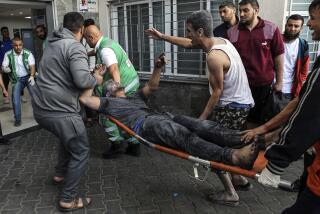Blair prepares Britain for pending military action
- Share via
BRIGHTON, England — Prime Minister Tony Blair on Tuesday braced Britain for war with the Taliban government of Afghanistan, stating that diplomacy has failed and will be followed by military action.
Blair told his Labor Party conference that “proportionate” and “targeted” military strikes would be carried out against Osama bin Laden, viewed by the Bush administration as the chief suspect in the Sept. 11 attacks on the United States, and the Taliban regime in Afghanistan that shelters him.
“Any action taken will be against the terrorist network of bin Laden. As for the Taliban ... the aim will be to eliminate their military hardware, cut off their finances, disrupt their supplies, target their troops, not civilians. We will put a trap around the regime,” Blair said in an impassioned speech.
“I say to the Taliban: Surrender the terrorists or surrender power,” he said.
The normally fractious party put aside its differences -- and reservations about the shape of the war to come -- to unite behind Blair with round after round of applause.
Criticisms of the prime minister’s go-it-alone style of leadership and arguments with his policies that were likely to have dominated the annual conference were strikingly absent in the aftermath of the Sept. 11 strikes, which left about 6,000 dead or missing, including hundreds of Britons. While he dedicated much of his hourlong speech to foreign policy and the fight against terrorism, Blair seized the moment to press the rest of his controversial political agenda without dissent.
Blair is at his best in the role of a statesman on a moral crusade. He won high marks from Britons two years ago for leading Europeans into the U.S.-backed war against the ethnic cleansing of Muslims in Kosovo province. Acknowledging Britons fears about the coming war, he reminded them of their victory against former Yugoslav President Slobodan Milosevic.
“Look what happened: We won, the refugees went home, the policies of ethnic cleansing were reversed and one of the great dictators of the last century will see justice in this century,” Blair said of Milosevic, who is awaiting trial in The Hague on war-crimes charges.
Blair did not tell the party faithful when the next war will begin, but he assured them that it will.
“Whatever the dangers of the action we take, the dangers of inaction are far, far greater,” he said.
Many Britons believe Blair has had a tempering effect on the U.S. response to the attacks, arguing against immediate military retribution and backing Secretary of State Colin L. Powell’s arguments for limiting reprisals to bin Laden and the Taliban. They believe Blair has been key in building the international coalition behind the coming strikes.
While raising his fists to the Taliban, he reinforced this image of moderation by telling the Afghan people the war “will not be the end” of the West’s involvement in their impoverished country.
“We will not walk away as the outside world has done so many times before,” he said. “If the Taliban regime changes, we will work to make sure its successor is broad-based ... and offers some way out of the miserable poverty that is your present existence.”
In his speech, Blair wove global and local issues together around the desire for order and stability, which he said cannot exist in Britain if it does not exist elsewhere. He came out strongly for the nation’s engagement with Europe and said, in stronger terms than before, that if the economic conditions are right for joining the common European currency he will “have the courage of our argument” and hold a referendum on the controversial issue during this Parliament.
In the media, Blair has been heavily criticized for his “disregard” of the Cabinet and Parliament, for a style of government more presidential than President Bush’s. Political commentators say there is too little debate and too much rubber-stamping.
In Brighton, however, delegate Patsy Jones said, “He’s certainly not moving without the people, I assure you.”
Jane Lewis concurred: “Perhaps we’re not used to a leader who is quite so good at leading,” she said.
Admiring the speech and the show of unity, Colin Challen, a member of Parliament, was more cautious. The hard part for Blair and the country is yet to come, he said, adding: “This (unity) will be tested as soon as there is collateral damage, civilian casualties. That’s inevitable.”
More to Read
Sign up for Essential California
The most important California stories and recommendations in your inbox every morning.
You may occasionally receive promotional content from the Los Angeles Times.










